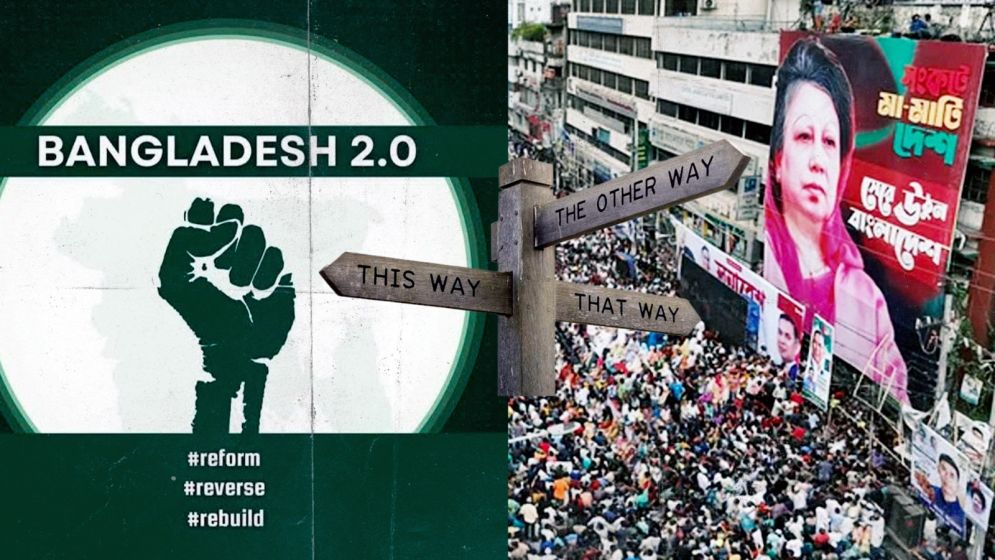Pull the trigger or hold the line? Inside BNP’s strategic paralysis

At this critical juncture, the question facing Bangladesh Nationalist Party (BNP) is as stark as it is consequential: to pull the trigger–or not.
The party has the organizational muscle to unseat a faltering and visibly hesitant interim government. The rhetoric pouring out of Tarique Rahman and his right-hand man, Salahuddin Ahmed, has steadily climbed in temperature, pushing the political mercury dangerously close to boiling.
Add to that the provocations from Dr Muhammad Yunus in Japan, whose apparent indifference from abroad has only added gasoline to the fire. All signs point to escalation. Yet, for now, the match remains unstruck.
Why? The answer, it seems, lies more in psychology than in strategy.
Tarique Rahman, the heir to BNP’s legacy, appears trapped in a cycle of hesitation. Despite having a government on the defensive, despite holding the moral outrage of a suppressed electorate in his hands, he wavers.
His indecision is not new. Over coffee in London last year, just months after the farcical election that buried hopes of a democratic reset, I pressed a BNP insider on this very question: Why didn’t Tarique go for broke? Why not a scorched-earth strategy? Why didn’t the party dig in, occupy Dhaka, and force the confrontation?
The answer I received was unsettling. According to this well-connected party worker, Tarique did not want to shoulder the burden of bloodshed. He balked at the cost of violence, even if it promised a shot at justice.
This moral hesitation might be admirable in a philosopher. But in a political leader? It’s a liability.
History–especially in Bangladesh–is written in blood. From the Language Movement to the Liberation War to the fall of autocrats, it is sacrifice that moves the needle. Sheikh Hasina, for all her flaws, understands this well.
She has governed with a stomach of steel. Tarique, by contrast, seems weighed down by caution.
The deeper truth, as I see it, is this: Tarique Rahman is a leader caught between the myth of revolution and the reality of risk. When the stakes rise, he retreats into ambiguity. It is not about lacking power–it is about lacking resolve.
-683c4152b955d.png)
The cost of being violent
Let’s entertain the scenario the BNP faithful quietly fantasize about: the streets ignite, the regime collapses, and the interim government is forced to its knees. BNP wins the street war.
And then what? As the old adage goes: You break it, you buy it.
Toppling a government is only the prelude. The real burden begins the next morning–when BNP finds itself holding the bag. The responsibility for shaping the next pre-election government will shift squarely onto Tarique Rahman’s shoulders.
This is where the fantasy collides with harsh political physics.
The military might give tacit support–perhaps even overt endorsement. But even that comes with strings. In today’s hyper-polarized Bangladesh, if the army chief so much as blinks in BNP’s favor, he will instantly be branded complicit in what critics will frame as an "Indian-produced, BNP-created" crisis.
The National Citizen Party (NCP) and its ilk–whatever Jamaat-e-Islami decides to do–will cry foul. The same accusations of bias, manipulation, and authoritarian drift that once hounded the Awami League will now land at BNP’s doorstep.
The legitimacy of the next election–a contest BNP is currently favored to win–will be tainted before a single vote is cast. The army chief’s credibility will take a hit. And so will Tarique Rahman’s. After two decades of political exile, is he ready to walk into power through a backdoor so riddled with suspicion?
He knows the answer. Which is why he hesitates.
Pulling the trigger now doesn’t just spark chaos–it hands BNP ownership of the chaos. Whatever transitional government emerges will be seen as BNP’s creature. If it falters–as it almost certainly will in the pressure cooker of Bangladesh’s violent, unstable pre-election period–BNP will pay the price.
Legally, the High Court's restoration of the 13th Amendment brings back a neutral caretaker arrangement. Any transitional setup, by definition, then can be considered a caretaker government.
The constitution allows three months. But in a country where politics can turn overnight, three months can feel like a year–and a year can end a movement. Civil unrest, institutional breakdown, and opportunistic violence will be inevitable. Even if the army chief himself were to head the transitional government, he would struggle to contain it.
And every failure–every riot, every corruption leak, every administrative slip–will be laid at BNP’s feet.
-683c417f2a070.png)
Possible way for BNP
Ironically, BNP’s greatest strength right now is its plausible deniability. The party dominates the civil administration without being visibly in charge. That stealth influence is a political goldmine. It lets them shape outcomes without assuming formal responsibility. They reap the benefits while blaming the costs on others.
Why give that up?
If a new government is formed under BNP’s banner–no matter how indirectly–the party will be forced to own every mistake made by the bureaucracy it now manipulates from the shadows. That is not an upgrade. It is a trap.
In short, BNP today enjoys the rarest gift in politics: power without accountability. Why squander that for a premature victory that could taint the very electoral win they’ve been preparing for?
The longer Tarique waits, the more fragile the interim regime becomes. But the moment he moves, the blame game begins–and this time, the finger will point at him.
From where I sit, it’s clear that Professor Yunus and his coterie of political advisors have already run the numbers. That’s what gives them their current posture of defiance: they believe they’ve cornered the opposition in a classic Mexican standoff–guns drawn, no one blinking, and no one foolish enough to fire first.
Tarique Rahman’s camp, for all its bravado, seems to have done the same calculus. Behind the rhetoric and rising tempo, there is caution. Mutual brinkmanship has created a strange, fragile equilibrium. No one escalates, no one retreats. And so, the deadlock persists.
But while both camps hold their fire, the people of Bangladesh are left trapped in the crosshairs.
This standoff might serve the short-term interests of the political elite, but it is poison to the public good. Reform–real, structural, long-overdue reform–is the casualty. BNP clings to its old maximalist positions, unwilling to recalibrate.
The interim government, propped up by academic technocracy and nervous power brokers, appears equally unwilling to yield.
And so the national crisis festers. Movements stall. Institutions rot. The democratic promise remains a mirage. For all the posturing, this ends where so many cycles of Bangladeshi politics have ended before: in stasis.
Unless someone moves–unless someone chooses courage over calculation–this moment, like many before it, will collapse into bitter irrelevance. The country will be no closer to reform, no closer to healing, and certainly no closer to democracy.
The guns may stay holstered–for now. But the damage is already done.
—
Adil Mahmood is a former journalist.

